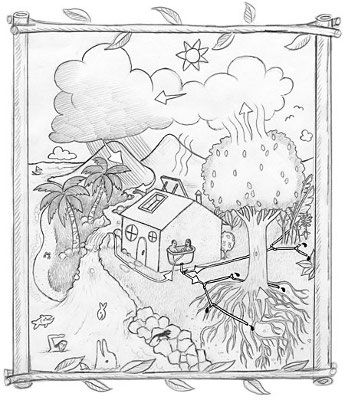
Create an Oasis with Greywater
 Create
an Oasis with Greywater seems to be the primary text
available on
the subject, so if you want to deal with wastewater in an alternative
manner, you'll need to get your hands on a copy. The book is
self-published, but the only negative I can come up with is that the
interior layout isn't very enticing --- too little white space on the
page. However, I think that Art Ludwig chose the design
intentionally so he could fit 300 pages worth of information into a 144
page book, thus cutting down fewer trees and selling the book for a
more reasonable price.
Create
an Oasis with Greywater seems to be the primary text
available on
the subject, so if you want to deal with wastewater in an alternative
manner, you'll need to get your hands on a copy. The book is
self-published, but the only negative I can come up with is that the
interior layout isn't very enticing --- too little white space on the
page. However, I think that Art Ludwig chose the design
intentionally so he could fit 300 pages worth of information into a 144
page book, thus cutting down fewer trees and selling the book for a
more reasonable price.
That small caveat aside,
Create
an Oasis with Greywater is a masterpiece. The
fifth edition is completely polished, easy to read, and full of useful
information for everyone from the ramshackle DIYer (that's me) to folks
living in mansions who want to hire someone to create a high tech lawn
irrigation system connected to their washing machine outflow hose.
 In case you've never run
across the term before, "greywater" is all of the waste water coming
from your house except from the toilet. The water flowing down
the drain of your kitchen sink is definitely not potable, but is
generally pretty low in harmful bacteria and can be easily and safely
treated with low tech options that irrigate your plants at the same
time. In addition to helping your plants, channeling your
greywater to a separate location from your blackwater means you
use less energy to treat the latter, which is good for the environment.
In case you've never run
across the term before, "greywater" is all of the waste water coming
from your house except from the toilet. The water flowing down
the drain of your kitchen sink is definitely not potable, but is
generally pretty low in harmful bacteria and can be easily and safely
treated with low tech options that irrigate your plants at the same
time. In addition to helping your plants, channeling your
greywater to a separate location from your blackwater means you
use less energy to treat the latter, which is good for the environment.
To make the best use of
greywater, you'll need to be careful with what you put down the drain
(something you should be doing anyway), and to understand your specific
site conditions and climate. The rest of this week's lunchtime
series will cover a few of the greywater treatment methods that
appealed most to me, but I highly recommend finding this book for
yourself if you want to delve deeper into greywater systems.
| This post is part of our Create an Oasis with Greywater lunchtime
series.
Read all of the entries: |
Want more in-depth information? Browse through our books.
Or explore more posts by date or by subject.
About us: Anna Hess and Mark Hamilton spent over a decade living self-sufficiently in the mountains of Virginia before moving north to start over from scratch in the foothills of Ohio. They've experimented with permaculture, no-till gardening, trailersteading, home-based microbusinesses and much more, writing about their adventures in both blogs and books.
Want to be notified when new comments are posted on this page? Click on the RSS button after you add a comment to subscribe to the comment feed, or simply check the box beside "email replies to me" while writing your comment.

I bought this book seven years ago when I built my house, and I still find myself referencing it. We have had very few problems with the system, and the ones we have are a result of me second guessing Art. Don't do that.
I highly recommend this book.
J --- Greywater systems are tougher in climates like yours and ours where it gets cold during the winter, which is probably why you hear about so many systems in the planning stages but few in the implementation stages. Stay tuned for later posts in the series that walk you through some potential solutions to that problem.....
Sounds like a fascinating summer touring organic farms!